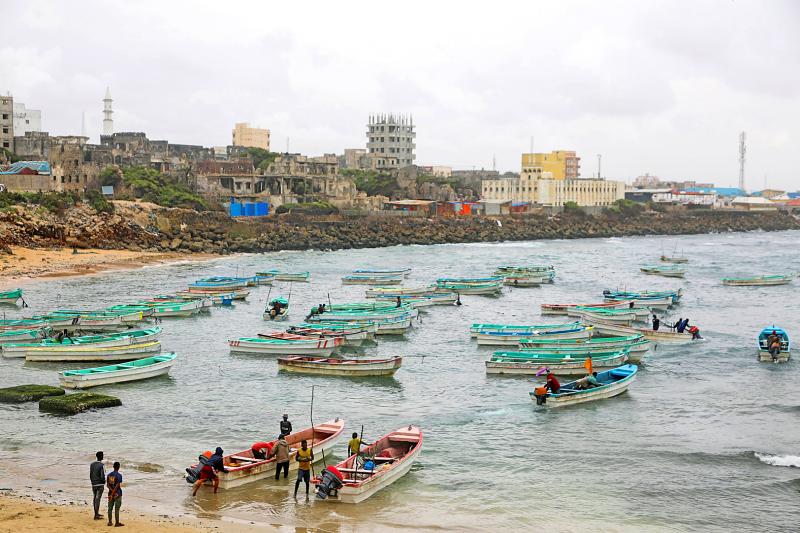The UN’s top court on Tuesday handed Somalia control of most of a potentially oil and gas-rich chunk of the Indian Ocean after a bitter legal battle with Kenya, which strongly rejected the ruling.
Kenya got only a small slice of the disputed tract of sea off the east African coast in the ruling by the International Court of Justice.
Kenyan President Uhuru Kenyatta said that his government “rejects in totality and does not recognize the findings in the decision.”

Photo: Reuters
With Kenya refusing to recognize the “biased” court’s authority, all eyes will be on what Nairobi does next in one of the world’s most troubled regions.
Somalia urged Kenya to “respect the international rule of law” following the verdict by the court based in The Hague.
Judges unanimously ruled that there was “no agreed maritime boundary” in force and drew a new border close to the one claimed by Somalia.
Chief judge Joan Donoghue, reading a summary of the judgement, said that the “court is thus satisfied that the adjusted line ... achieves an equitable solution.”
Somalia took Kenya to the court in 2014 after efforts to resolve a dispute over the 100,000km2 tract failed.
The court’s judgement is final and cannot be appealed, but the court, set up after World War II to rule in disputes between UN states, has no means of enforcing its rulings.
However, states can go to the UN Security Council if another country fails to obey a ruling.
In a televised speech, Somalian President Mohamed Abdullahi Mohamed, who is widely known as Farmaajo, said that Nairobi should see the ruling as an “opportunity to strengthen the relationship of the two countries.”
“The verdict was a fair indication of the transparency of the International Court of Justice,” Farmaajo said, adding that he had faced “political, diplomatic, security and economic pressure by the Kenyan leadership.”
Kenyatta said that the ruling amounted to “a zero-sum game, which will strain the relations between the two countries.”
“It will also reverse the social, political and economic gains; and potentially aggravate the peace and security situation in the fragile Horn of Africa region,” he said, reiterating Nairobi’s support for a negotiated settlement instead.
At the heart of the Somalia-Kenya dispute was the direction that their joint maritime boundary should extend from where their land frontiers meet on the coast.
Somalia said that the boundary should follow the orientation of its land border and thus head out in a 200 nautical mile (370.4km) line toward the southeast.
Kenya said its boundary runs in a straight line due east — a delineation that would have given it a big triangular slice of the sea.
Nairobi says it has exercised sovereignty over the area since 1979.
The contested area is believed to contain rich gas and oil deposits, and also has key fishing rights.
Kenya has already granted exploration permits to Italian energy giant ENI, but Somalia is contesting the move.
The court threw out Kenya’s argument that Somalia had “acquiesced” to its claims by not protesting more strongly.
It also rejected the line that Nairobi wanted to draw from the coast, saying it would have a “severe cut-off effect” for Somalia.
However, it adjusted Mogadishu’s proposal slightly, saying that Kenya risked having its own maritime rights sandwiched between Somalia and Tanzania.

A fire caused by a burst gas pipe yesterday spread to several homes and sent a fireball soaring into the sky outside Malaysia’s largest city, injuring more than 100 people. The towering inferno near a gas station in Putra Heights outside Kuala Lumpur was visible for kilometers and lasted for several hours. It happened during a public holiday as Muslims, who are the majority in Malaysia, celebrate the second day of Eid al-Fitr. National oil company Petronas said the fire started at one of its gas pipelines at 8:10am and the affected pipeline was later isolated. Disaster management officials said shutting the

US Vice President J.D. Vance on Friday accused Denmark of not having done enough to protect Greenland, when he visited the strategically placed and resource-rich Danish territory coveted by US President Donald Trump. Vance made his comment during a trip to the Pituffik Space Base in northwestern Greenland, a visit viewed by Copenhagen and Nuuk as a provocation. “Our message to Denmark is very simple: You have not done a good job by the people of Greenland,” Vance told a news conference. “You have under-invested in the people of Greenland, and you have under-invested in the security architecture of this

Japan unveiled a plan on Thursday to evacuate around 120,000 residents and tourists from its southern islets near Taiwan within six days in the event of an “emergency”. The plan was put together as “the security situation surrounding our nation grows severe” and with an “emergency” in mind, the government’s crisis management office said. Exactly what that emergency might be was left unspecified in the plan but it envisages the evacuation of around 120,000 people in five Japanese islets close to Taiwan. China claims Taiwan as part of its territory and has stepped up military pressure in recent years, including

UNREST: The authorities in Turkey arrested 13 Turkish journalists in five days, deported a BBC correspondent and on Thursday arrested a reporter from Sweden Waving flags and chanting slogans, many hundreds of thousands of anti-government demonstrators on Saturday rallied in Istanbul, Turkey, in defence of democracy after the arrest of Istanbul Mayor Ekrem Imamoglu which sparked Turkey’s worst street unrest in more than a decade. Under a cloudless blue sky, vast crowds gathered in Maltepe on the Asian side of Turkey’s biggest city on the eve of the Eid al-Fitr celebration which started yesterday, marking the end of Ramadan. Ozgur Ozel, chairman of the main opposition Republican People’s Party (CHP), which organized the rally, said there were 2.2 million people in the crowd, but